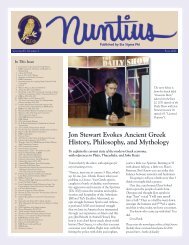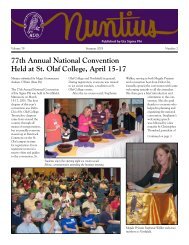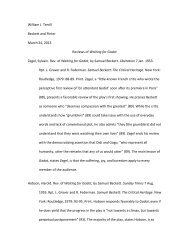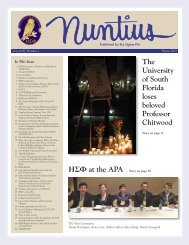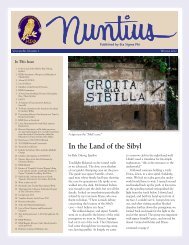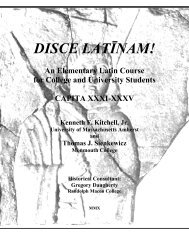Vol. 82, No. 2, Summer 2008 - Monmouth College
Vol. 82, No. 2, Summer 2008 - Monmouth College
Vol. 82, No. 2, Summer 2008 - Monmouth College
You also want an ePaper? Increase the reach of your titles
YUMPU automatically turns print PDFs into web optimized ePapers that Google loves.
All the evidence that I have collected(in which not all of it I could mention),points to the conclusion that Gortynia hasa very deep relationship with the disappearanceof the remains of Alexander,than any researcher could have hoped orrealized. Could it be that after all theseyears, those devout followers of Alexander,people who even worshiped him, listenedto his final testimony and brought hisremains to the land of his Arkadian ancestorsand the birthplace of his “true” father?To the land where his immortal father’sspirit resides? <strong>No</strong> one will truly know,unless a group of passionate archaeologiststake it upon themselves to search onceagain for his remains.The land of Arkadia still has mysterieswaiting to reveal to the people of Greeceand to the rest of the world. One couldstart in the land of Gortynia and use astheir guide the local inhabitants, who stillseem to remember the local legends ofthe arrival and departure of Alexanderthe Great. These very people, who usedas their official seal the emblem depictingthe thorax and spear of Alexander, andwho live in the shadow of Mt. Lykaion, thebirthplace of Zeus and of Hellenism, maybe the ones who can further aid in solvingthe great mystery.For the record, I am not saying that thisByzantine icon of “Abba St. Sisois visitingthe remains of dead Great Alexander,”proves that Alexander’s mummifiedremains are in the land of Gortynia, inArkadia. Just relying on the Byzantineicon, is not scholarly enough for a claim.The icon just led me to other interestingfacts and clues, which help make a solidargument for them to have been broughtto Gortynia-Arkadia. This is why it iscalled a “theory” and not a “definitiveclaim.” But as all researchers in Academiawho create an original theory, I amstrongly supporting mine, as well as supportingother theories on the subject.Furthermore, many researchers andarchaeologists are trying to discover thetomb of Alexander the Great in Alexandriaor in the Oasis of Siwa in Egypt. Theyare constantly exploring and excavatingthe region, for the reason that, accordingto Diodoros Sikelos, Alexander wantedto buried near his father. Many scholarsbelieve this remark to refer to Alexander’strue father, Ammon Zeus, thus, they supposehis body is still in Egypt. But AmmonZeus was indeed worshipped in manyother areas, especially in Hellas. He wasthe equivalent of the Hellenic god, LykaiosZeus (“Zeus, the Enlightened One”),who was heavily worshipped in Gortynia-Arkadia (*<strong>No</strong>te: Proof of this is fromancient coins that have been discoveredin colonies founded by Arkadians, withthe image of Ammon Zeus on the obverseof the coins, and the reverse having thename ARKADWN inscribed on it, in referenceto the coin being of the Arkadians;c. 400-300 B.C.). Till this day, nothing hasbeen found regarding the tomb of Alexander.Many individuals have been searchingfor his remains for many centuries. But myconcern is not the tomb, but where in factwhere his mummified remains mysteriouslytransported to. It is not that difficult tosuppose that his remains may have beenpossibly returned to Greece, by individualswho still worshipped him.The main reason why Alexander’sremains could have been brought to Gortynia,is because in that vicinity of ancientGortynos is Mount Lykaion, the reputedbirthplace of Lykaios Zeus. Alexandertruly believed he was the Son of Zeus. Ifone reads and thoroughly analyzes all ofhis biographical accounts from credibleancient sources, in their original languages,Alexander presumably wished to be buriedin the land of his Father when he died.The ancient Hellenes knew of MountLykaion as being the holy vicinity of thespirit of Zeus. This is also the reason, towhy the Arkadians further called it by thename of Mount Olympos. Furthermore,this is also a very possible reason, to whichwhy Alexander went to Gortynos at age20; (*<strong>No</strong>te: Gortynos at that time was amere village, because the City of Megalopolisnearby became the “metropolis” ofthe Arkadian cities). Alexander traveledthere, because Mount Lykaion is in closedistance of the city and acknowledgedhimself as a Pelasgian/Arkadian, in whichPelasgos (father of King Lykaon of Arkadia)was believed to have been a Son ofZeus himself.Nevertheless, for a man who trulybelieved that he was a Son of Zeus, havinghim finally rested within the sacred vicinityof Mt. Lykaion, would have been thebest way for devout worshippers of Alexanderto honor his memory and probableconscience wish.Gortynia, the sacred vicinity of Zeus,would have been the most plausible ofareas, in order for his devout followers tohave finally rested Alexander’s remains, if,and only, they actually did acquire them.I am just focused on where GreatAlexander’s mummified remains couldfinally have been rested, unlike many otherresearchers and scholars who are searchingfor his initial tomb or tombs, for there werea few historically recorded. My opinionon that matter, is that his tomb is still inAlexandria, Egypt. The difference withmy original theory is not about the tombof Alexander, which many people think atfirst when they read my report, but abouthis mummified remains. Nevertheless, allpossibilities and theories, based on ancientand medieval accounts, should be takenseriously, regarding the mystery of theremains of Great Alexander. The benefitsabout theorizing, is that it helps theprocess of coming one step closer in tryingto solve such a great mystery, as to whatactually happened to the great Hellene’smummified remains.When Hellenes are involved, everythingis a possibility.Link 1: CNN International’s iReport ForCNN program which first featured myAlexander the Great research/video journalon Tuesday, May 13, <strong>2008</strong>.My segment is at the 6 minute markof the acclaimed program. www.cnn.com/video/#/video/ireports/<strong>2008</strong>/05/16/ireport.for.cnn.a.myanmar.cnnLink 2: Alexander the Great New Research-Are His Mummified Remains in Gortynia-Arkadia, Greece? Full Descriptive VideoJournal iReport (11 min, 45 secs).www.ireport.com/docs/DOC-24455Link 3: Alexander the Great Discovery WritteniReport with images, which first caughtCNN’s attention to vett my story andresearch, and show it on CNN International.www.ireport.com/docs/DOC-201851





